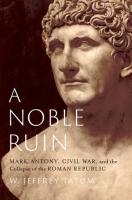
OUP (2023) h/b 352pp £26.99 (ISBN 9780197694909)
Few Romans seem as familiar as Mark Antony, the charismatic patrician and successful soldier eventually undone by his obsession with a beguiling foreign wife (or was she just his mistress?). Yet even in antiquity recollections varied, and it is difficult to reconstruct the real character from the calumny.
Contemporary sources often weigh against him, whether they be Cicero bitching in letters to his friends, Dellius (Rome’s Vicar of Bray) penning sexed-up accounts of Antony’s campaigns (including his now sadly lost ‘Dirty Letters to Cleopatra’) or Octavian-Augustus mobilising the great propaganda-war-machine of Rome. As a result of these and of the sheer romance of his curriculum vitae, he tends to be seen as a louche hedonist rather than the hard-nosed, calculating politician that he almost certainly was.
It is to T.’s credit that in this exhaustive biography he seeks to redress the balance. Committed readers will value the detail in which he covers issues ranging from the Republican constitution to the intricacies of what happened in the first eight months of 44 BC (he devotes two chapters to this alone) and reassesses questions spanning Antony’s real-estate portfolio and his mercurial relationship with frenemies such as Cicero and the future Augustus (‘precarity pervaded all dealings between Antony and Octavian’). Throughout, T.’s deep knowledge of this complex period and the personalities who shaped it is apparent, and one of his great strengths is his ability to view events through the prism of the moment rather than the distorting lens of later history. There can be no doubt that his masterly treatment will be valued by scholars.
But what of the more general reader? In his preface, T. writes that the book ‘is accessible to any reader, or at least I hope it is’, adding that ‘throughout the volume there is more than one excursion aimed at clarifying technical matters essential for the understanding of Antony’s career.’ Perversely, these very excursions—containing a plethora of information, much of which could have been usefully relegated to appendices—may deter non specialists, as might T.’s prose style. Too often an overtly Latinate syntax denies the narrative the impetus that it deserves, with sentences such as ‘The city, however, because it was too important to abandon, he besieged’, or ‘Later, when vituperating Octavian’s character, Antony animadverted on his treachery in corrupting Lepidus’ soldiers’, reading more like literal translations than easy English. General readers, too, may regret the dearth of maps, which would have helped make sense of a narrative encompassing such a vast geographical spread. (In the advance copy, one map was wrongly captioned, and there were several typos, which it is hoped will be corrected before publication.) More crucially, however, general readers may conclude that, because T. is interested primarily in dissecting how his subject fitted into the systems and mores of the Roman Republic, Antony’s humanity is side-lined, so that he seems little but a two-dimensional cipher. Even (or, perhaps, especially) his relationship with Cleopatra is downplayed: ‘Fond of her though he plainly was, an efficient and tolerable administration came first’; ‘We are right in ignoring our sources’ stories of lurid or romantic enamoration.’
With copious endnotes and a twenty-seven-page bibliography this, then, is a book primarily for the specialist, who will find much in it to admire. Less dedicated readers, however, while agreeing with T. that ‘Antony was and is a kind of guilty pleasure’, might wish to gratify that pleasure elsewhere.
David Stuttard
